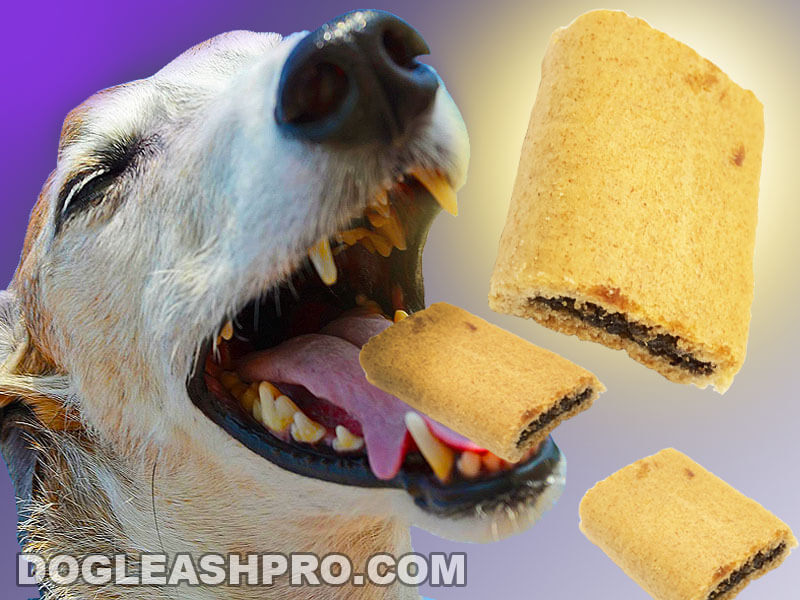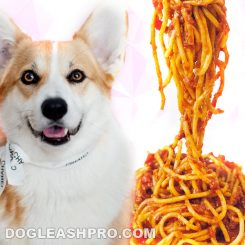
Are you snacking on some Fig Newtons cookies? Is your canine companion eyeing your Fig Newtons bar and drooling uncontrollably? Like many dog parents, we are tempted to share our human snacks with our furry friends. But is that a good idea? Can a dog eat Fig Newtons? Here’s the short answer first.
Can dogs eat Fig Newtons? No, dogs should not eat Fig Newtons as they are unhealthy for dogs, even as a treat. Fig Newtons are packed full of sugar, fat, sodium, and carbohydrate. Offering this cookie to your pooch daily can lead to canine obesity, diabetes, and even pancreatitis. With that said, Fig Newtons aren’t toxic to dogs so if you do find an empty Fig Newtons wrapper and a guilty-looking dog, there’s no need to panic.
While Fig Newtons may contain the fruit Figs as one of its ingredients, is this snack healthy for our dogs? In this guide, we will discuss everything you need to know about Fig Newtons and dogs. We’ll take a closer look at the ingredients and nutritional profile of Fig Newtons and go over what happens to our dogs’ health when they eat this regularly.
Table of Contents
Can dogs have Fig Newtons?
No, dogs should not have Fig Newtons and it is not a good idea to share Fig Newtons with our canine friends on a regular basis. While we are tempted to give our furry friends some Fig Newton cookies or Fig Newton bars whenever they’re giving us that puppy dog eyes, it’s best that we do not give in.
When it comes to doggy food and snacks, you’ll want to stick to the 90/10 rule. This means that 90% of your K9 friends’ daily calories should come from a well-balanced, nutritious, and complete diet while only 10% of their daily calories should come from treats.
In addition, we highly recommend giving your fur babies treats that are actually healthy and good for them.
Fig Newtons aren’t considered a healthy or good treat for our four-legged friends. In the next section, we’ll explain in-depth why Fig Newtons are not considered a great treat option for our dogs.
Don’t miss: Can Dogs Eat Apricots?
Are Fig Newtons bad for dogs?
Yes, Fig Newtons are bad for dogs. While Fig Newtons aren’t toxic or poisonous to our furry family members, that doesn’t mean that our dogs can eat them.
Here’s why.
To understand why Fig Newtons aren’t great for our four-legged friends, let’s take a closer look at the ingredients in your typical Nabisco Fig Newtons.
- Whole grain wheat flour.
- Figs.
- Sugar.
- Corn syrup.
- Invert sugar.
- Vegetable Oil (Soybean and/or Canola and/or Palm and/or Partially Hydrogenated Cottonseed Oil).
- Soluble corn fiber.
- Oat fiber.
- Salt.
- Resistant corn maltodextrin.
- Baking soda.
- Calcium lactate.
- Malic acid.
- Soy lecithin.
- Sodium benzoate (added to preserve freshness).
- Sulfur dioxide (Sulfites added to preserve freshness).
- Natural flavor.
- Artificial flavor.
Whole grain wheat flour in Fig Newtons is not safe for dogs with wheat allergy
When it comes to reading the ingredients list, it’s important to keep in mind that the ingredients are listed from the highest amount to the lowest amount.
For instance, when you take a look at the ingredient list of Fig Newtons, you’ll notice that whole grain wheat flour is listed first. This means that the manufacturer uses whole grain wheat flour the most to make the Fig Newtons.
The first ingredient on the list also means that it weighs the most and the last ingredient on the list weighs the least.
With whole grain wheat flour making the largest part of what is to be eaten, it’s no wonder why the carbs are so high at 11 grams!
If your pooch has wheat allergies, it’s a good idea to keep the Fig Newtons as far away from him as possible.
You may be interested in: Can Dogs Eat Crackers?
Even if your K9 friends can tolerate wheat, it’s not a good idea to feed them any food or treat that contains tons of wheat flour. That’s because our four-legged friends don’t need flour in their diet.
You’ll find flour in plenty of dog treats and food because it’s usually used to bind ingredients together. But generally, dogs do not require flour in their daily diet.
Instead of whole grain wheat flour, try these healthier flours instead if you’re planning to make homemade doggy treats:
- Buckwheat.
- Quinoa.
- Oat.
- Barley.
- Pea.
- Millet.
You can alternatively choose non-grain flours instead that are good for dogs such as:
- Coconut.
- Almond.
- Potato.
- Chickpea.
- Lentil.
- Hazelnut.
Related Article: If you’re making homemade treats for your Fido, try using Amaranth, a superfood that isn’t a grain and doesn’t contain gluten. Check out Can Dogs Eat Amaranth? to learn why many pet owners are switching to amaranth flour for doggy treats.
A general rule of thumb is to take a look at the top three ingredients used since they will make up the majority of what you’re eating. You can see that it is whole grain wheat flour, figs, and sugar.
We’ve just discussed whole grain wheat flour and how it can impact your dog’s health. Next, let’s go over figs and sugar. Keep reading because you don’t want to miss this!
Sugar in Fig Newtons can lead to obesity, diabetes, and pancreatitis in dogs
Sugar is extremely harmful to our canine friends. No matter if it’s called sugar, corn syrup, invert sugar, or high fructose corn syrup, they are all simply sugar.
You can see in the ingredient list that there are various types of sugar in Fig Newtons. There’s sugar, corn syrup, and invert sugar and they are all bad for your dog’s health.
Our furry friend’s diet does not require sugar. As a matter of fact, our four-legged friends should not have sugar at all.
Upset stomach and diarrhea
When dogs ingest too much sugar from Fig Newtons, they will immediately start to feel the negative consequences of doing so. Too much sugar intake can cause an upset stomach in dogs because ingesting more sugar than they usually do can disrupt the balance of good and bad bacteria in their stomach and digestive system.
As a result of an imbalance of good and bad bacteria as well as other microorganisms in your dog’s gut, they may start vomiting and have bloody and explosive diarrhea. If your pups keep vomiting and have diarrhea, it can put them at risk of dehydration.
Weight gain and canine obesity
Dogs that regularly consume sugary food and snacks like Fig Newtons will start to gain weight. Keep in mind that sugary food and snacks are mostly empty-calorie food. This means that sugary food provides no nutritional benefit to your dog’s health and it only causes your dog to pack on the pound.
Once your pooch starts to gain weight, it can affect his physical, mental, and emotional state. That’s because gaining weight can put stress on their joints and lead to joint problems. Additionally, they may have trouble breathing.
All of this can cause your dog to become lethargic and less active. He may not want to play as much anymore or he may prefer to lie down all day instead of wanting to go out for a walk.
As we can see, his quality of life will decrease since his physical state can also affect his mental state and mood. If he’s feeling sad, depressed, or anxious, he may continue to stay inactive and this becomes a vicious cycle of weight gain and inactivity.
And these are just a few of the health problems your pup will face. Obese dogs may also have a high chance of getting heart disease, arthritis, respiratory problems, and even diabetes.
Let’s discuss diabetes next.
Read also: Can Dogs Eat Brown Sugar?
Sugary food and snacks can lead to diabetes
Obese dogs are also at a higher risk of developing Type II diabetes. When our furry companions have Type II diabetes, their pancreases aren’t able to make insulin or produce very little so they can’t process sugar properly. As a result, this may lead to excess production of insulin and there may be high sugar levels in your dog’s blood.
Sugary treats like Fig Newtons can lead to changes in metabolism in dogs
When dogs eat tons of sugary snacks like Fig Newtons or eat them regularly, you may notice that their muscle tone may start to change. They may no longer have the defined muscle tones they’re supposed to have since there’s more fat storage in their body.
That’s because there’s an increase in insulin secretion caused by the sugar and this can affect your dog’s hormones. This causes a weaker immune system and low energy levels.
With each passing day, your pooch may become less and less active, weaker, and become heavier. This puts them at risk for canine obesity, infections, and various hormone-related diseases.
Also read: Can Dogs Eat Cereal?
Dental diseases including enamel loss, tooth decay, and cavities
Lastly, let’s not forget how sugar consumption can impact our dog’s teeth. Just like how we can get cavities from eating too many sugary snacks and food, the same can happen to our dogs. If you allow your pooch to eat Fig Newtons on a daily basis or regularly, they may start to get cavities and will suffer from dental disease.
That’s because the bacteria in your dog’s mouth use the sugar that’s left on your dog’s teeth and mouth to produce acids. Acid is harmful to your dog’s tooth enamel since it can eat away the minerals in the enamel. This is bad because the enamel is the outer coating that protects your dog’s teeth.
This is why it’s crucial that you brush your fur babies’ teeth regularly with dog toothpaste. The best dog toothpaste you can get for your furry friend is one that contains an enzymatic formula with a non-foaming agent.
The enzymatic formula in the doggy toothpaste will help to control tartar buildup and get rid of plaque. The non-foaming agent in the toothpaste means that your pooch can safely swallow it.
If you find it hard to brush your dog’s teeth, try getting a doggy toothpaste with flavors your K9 friends will love such as chicken or beef.
As always, we highly recommend that you bring your dog to see a vet every year and get professional teeth cleaning done.
Fig Newtons contain tons of salt which can cause salt poisoning in dogs
If you take a look at the nutritional profile of just one (1) Fig Newtons cookie, you’ll see that it contains 47.5 mg of sodium. While this isn’t a lot for us, 47.5 mg of sodium is definitely over the amount your dogs need every day.
This puts your pooch at risk of salt or sodium poisoning.
Signs and symptoms of salt poisoning include:
- Diarrhea.
- Vomiting.
- Loss of appetite.
- Frequent urination.
- Dehydration.
- Excessive thirst.
- Headache.
- Loss of balance and coordination.
- Confusion.
- Convulsions.
- Fluid buildup.
- Lethargy.
- High fever.
- Depression.
- Coma (in severe cases).
- Muscle tremors (in severe cases).
If you suspect your pooch has sodium poisoning, please contact your vet right away and bring him to the nearest veterinary hospital or veterinary emergency clinic. You can also contact the Pet Poison Helpline. It’s imperative to take action as soon as possible since salt toxicity requires immediate medical attention.
At the vet hospital, the vet will perform a physical checkup and a series of tests. If it seems like your pooch is dehydrated, the vet may administer any of the following:
- IV fluid therapy.
- Electrolytes.
- Oxygen.
Keep in mind that your pooch may need to stay at the vet hospital or emergency clinic overnight because the salt level will need to be brought down slowly and gradually. Any sudden changes in the salt levels can actually cause brain swelling (cerebral edema) or even a heart attack.
Depending on how high the salt levels are in your dog’s body, your canine friend may have to stay at the hospital for more than a day or two.
RECOMMENDED: Your dog’s vomit can tell you a lot about why he is feeling sick. Check out Dog Vomit Color Guide and keep it handy so you’re prepared the next time around.
So, are Fig Newtons ok for dogs?
No, Fig Newtons are not ok for dogs. While they are not toxic to dogs, they are high in calories, sugar, sodium, carbohydrate, and fat.
Nutritional Profile of Nabisco Fig Newtons (1 Cookie or 14.5g)
| Name, Unit | Amount |
| Calories, cal | 50 |
| Sugar, g | 6 |
| Sodium, mg | 47.5 |
| Total Carbohydrate, g | 11 |
| Total Fat, g | 0.8 |
| Protein, g | 0.5 |
| Fiber, g | 1 |
| Potassium, mg | 40 |
This means that one Fig Newtons cookie has 50 calories, 0.8 grams of fat, and 11 grams of carbohydrate (6 grams of sugar).
DISCLAIMER: THIS WEBSITE DOES NOT PROVIDE MEDICAL ADVICE
The information, including but not limited to, text, graphics, images and other material contained on this website are for informational purposes only. No material on this site is intended to be a substitute for professional veterinary advice, diagnosis, or treatment. Always seek the advice of your veterinarian or other qualified health care provider with any questions you may have regarding dietary needs.
FIG NEWTONS is a registered trademark of INTERCONTINENTAL GREAT BRANDS LLC. Dogleashpro does not claim any ownership of the FIG NEWTONS name, logo, or any identifying mark in any way. This article is for educational purposes only.
Resources:
https://en.wikipedia.org/wiki/Newtons_(cookie)
https://en-academic.com/dic.nsf/enwiki/186575

With over five years of specialized experience as an animal writer, my expertise lies in dog nutrition, health, behavior, grooming, and training. I am dedicated to delivering helpful and informative content that caters to the well-being of our furry friends. My primary goal is to empower pet owners with knowledge and ensure our canine companions thrive in health and happiness. In my free time, I love volunteering at local dog rescue centers.







